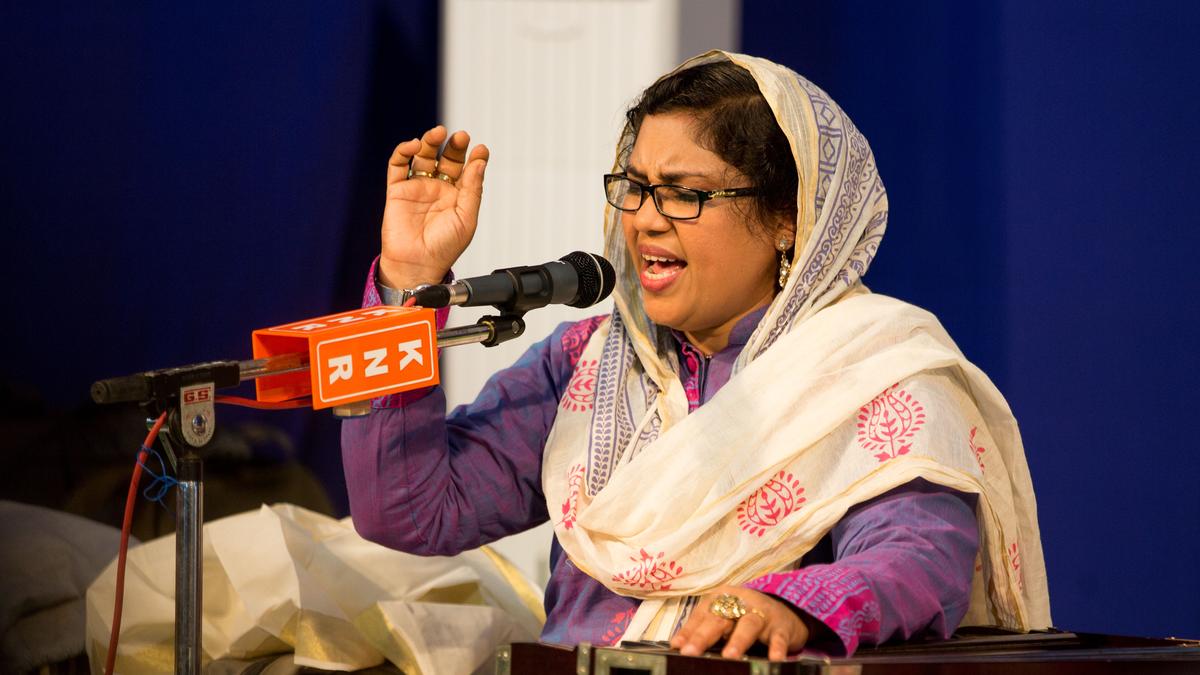She broke into the male bastion of qawwali singing several years ago and continues to enthral music lovers. Singer-composer Nisa Azeezi, 54, is among the recipients of the Kerala Sangeetha Nataka Akademi Award 2023. Having grown up in a family of musicians in Malappuram, Nisa says she owes it all to her father, MA Azeez, a Hindustani musician, and her gurus.
“Even though there are a lot of women ghazal singers now, women qawwali singers are not that common,” says Nisa over the phone from Shornur in Palakkad district.
Nisa started learning Hindustani at the age of four from AE Vincent and performed with her father for the first time when she was just six. Although Hindustani music was all around her, she was admitted to the Chembai Memorial Government Music College, Palakkad, to learn Carnatic music. “My father and my teacher, KG Marar, enrolled me in the music college. I was the first girl from the Muslim community to study Carnatic music there,” says Nisa. She performed at the Kalpathy chariot festival and various music festivals during the Navarathri festival, including at Thunchanparambu in Tirur, the birthplace of Thunchathu Ezhuthachan, the father of Malayalam language.
“Many from our community were unhappy with my decision to study music. But since my family supported me wholeheartedly, the going has been smooth,” says Nisa, eldest of Azeez’s nine children, better known as Azeez bhai in music circles of Malappuram.
While her sisters are not professionally into music, her brothers are full-time musicians. “One of my brothers accompanies me on the tabla at all my concerts,” she adds.
Ghazal and qawwali singer and composer Nisa Azeezi
| Photo Credit:
SPECIAL ARRANGEMENT
Nisa says she could not have asked for a bigger supporter than her husband, Mustafa Deshmangalam, a director and writer. “He chooses the songs that suit my voice.” Her two children are also into music.
Nisa has learnt Hindustani music from Saratchandra Marathe and Nalin Moolj and has also studied at Akhil Bharatiya Gandharva Mahavidyalaya Mandal, Mumbai. While serving as a teacher at MES Senior Secondary School, Tirur, she continued her Hindustani lessons under Ustad Faiyaz Ahmed Khan of Kirana gharana, Ustad Rafique Khan of Dharwad gharana and Umer Ustad of Jaipur gharana.
The musician says she has been hugely influenced by the singing of legendary Pakistani musician Abida Parveen, known as the Queen of Sufi music. “I have an open-throated voice and many people say that I have her style of singing,” she points out.
Although she sings both qawwalis and ghazals at her shows, there are more of the former . “Qawwali takes me to a state of trance, where I feel connected to a supreme power,” she says, adding, “There have been numerous programmes where I have wondered how I sang that. The beauty of this genre is that it is not confined to any particular religion,” she avers.
She has also been composing ghazals, which she presents at her shows. “I fondly remember Umbayi saab who popularised ghazals in Malayalam. We now have an audience who understands ghazals and that’s why we have so many ghazal singers in that part of Kerala,” says Nisa. She has released the Urdu ghazal album, Jasb-e-dil, a Malayalam ghazal album, Ethra Madhuramaayi Padunnu Nee, and a Sufi rock album, Ya Maula.
Rafeeq Ahamed, Alankode Leelakrishnan, TP Rajeevan, Sugathakumari, Anwar Ali etc are among the writers in Malayalam whose poems have been put to music by Nisa. She also performs works by legends Mehdi Hassan, Nayyara Noor, Noorjahan, Farida Khanu, Baburaj and the like. Nisa was in the news for rendering lines from the Balakandam of The Ramayana in Sufi style for an online event during the lockdown.
She cannot thank enough the encouragement she gets from the audience, especially from the North Malabar belt. “There have been occasions when the audience became my support singers during qawwali sessions. The good thing is qawwali and ghazal are slowly finding audiences in other parts of Kerala as well,” she says.
Currently, she is busy conducting online classes in Hindustani music for students from across the world. “My husband and friends often give me their poems to compose. I enjoy that process – sitting with my harmonium in a room and finding that tune.”

